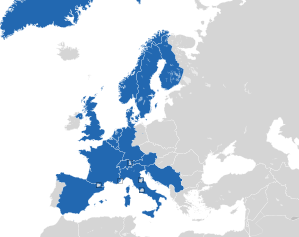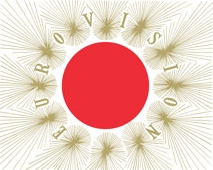
The Eurovision Song Contest 1969 was the 14th edition of the annual Eurovision Song Contest. It took place in Madrid, Spain, following the country's victory at the 1968 contest with the song "La La La" by Massiel. Organised by the European Broadcasting Union (EBU) and host broadcaster Televisión Española (TVE), the contest was held at the Teatro Real on 29 March 1969 and was hosted by Spanish television presenter and actress Laurita Valenzuela.

The Eurovision Song Contest 1968 was the 13th edition of the annual Eurovision Song Contest. It took place in London, United Kingdom, following the country's first victory at the 1967 contest with the song "Puppet on a String" by Sandie Shaw. Despite having won for the first time the year before, it was actually the third time that the United Kingdom had hosted the competition, having previously done so in 1960 and 1963, both of which also took place in London. Organised by the European Broadcasting Union (EBU) and host broadcaster British Broadcasting Corporation (BBC), the contest was held at Royal Albert Hall on 6 April 1968, and was hosted by Katie Boyle for the third time. It was notably also the first time that the contest was broadcast in colour.

The Eurovision Song Contest 1960 was the fifth edition of the annual Eurovision Song Contest, held on Tuesday 29 March 1960 at the Royal Festival Hall in London, United Kingdom, and hosted by British television presenter and actress Catherine Boyle. Organised by the European Broadcasting Union (EBU) and host broadcaster the British Broadcasting Corporation (BBC), the United Kingdom was offered the rights to stage the contest after the Netherlands, which had won the 1959 contest, declined the opportunity after having organised the event in 1958.
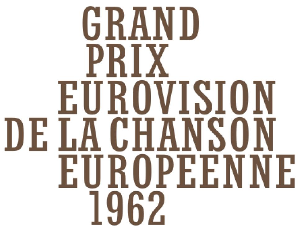
The Eurovision Song Contest 1962 was the 7th edition of the annual Eurovision Song Contest. It took place in Luxembourg City, Luxembourg, following the country's victory at the 1961 contest with the song "Nous les amoureux" by Jean-Claude Pascal. The contest was organised by the European Broadcasting Union (EBU) and host broadcaster Compagnie Luxembourgeoise de Télédiffusion (CLT), and was held at the Villa Louvigny on Sunday 18 March 1962 hosted by the Luxembourgish speaker Mireille Delannoy. This remains the last time that the final of the contest was not held on a Saturday, as since 1963 the final of the contest has consistently been held on a Saturday evening.
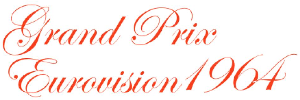
The Eurovision Song Contest 1964 was the 9th edition of the annual Eurovision Song Contest. It took place in Copenhagen, Denmark, following the country's victory at the 1963 contest with the song "Dansevise" by Grethe and Jørgen Ingmann. Organised by the European Broadcasting Union (EBU) and host broadcaster Danmarks Radio (DR), the contest was held at Tivolis Koncertsal on 21 March 1964, and was hosted by Danish TV presenter Lotte Wæver.

The Eurovision Song Contest 1966 was the 11th edition of the annual Eurovision Song Contest. It took place in Luxembourg City, Luxembourg, following the country's victory at the 1965 contest with the song "Poupée de cire, poupée de son" by France Gall. Organised by the European Broadcasting Union (EBU) and host broadcaster Compagnie Luxembourgeoise de Télédiffusion (CLT), the contest was held at the Villa Louvigny on 5 March 1966 and was hosted by Luxembourgish television presenter Josiane Chen.

The Eurovision Song Contest 1967 was the 12th edition of the annual Eurovision Song Contest. It took place in Vienna, Austria, following the country's victory at the 1966 contest with the song "Merci, Chérie" by Udo Jürgens. Organised by the European Broadcasting Union (EBU) and host broadcaster Österreichischer Rundfunk (ORF), the contest was held at the Großer Festsaal der Wiener Hofburg on 8 April 1967, becoming the first contest held in the month of April, and was hosted by Austrian actress Erica Vaal.

The Eurovision Song Contest 1995 was the 40th edition of the Eurovision Song Contest, held on 13 May 1995 at the Point Theatre in Dublin, Ireland. Organised by the European Broadcasting Union (EBU) and host broadcaster Radio Telefís Éireann (RTÉ), and presented by Mary Kennedy, the contest was held in Ireland following the country's victory at the 1994 contest with the song "Rock 'n' Roll Kids" by Paul Harrington and Charlie McGettigan. It was the third consecutive contest to be held in Ireland – the first and only time in the history of the event that a country has hosted three editions in a row – and the second consecutive edition to be held in the Point Theatre in Dublin.

The Eurovision Song Contest 1994 was the 39th edition of the Eurovision Song Contest, held on 30 April 1994 at the Point Theatre in Dublin, Ireland. Organised by the European Broadcasting Union (EBU) and host broadcaster Radio Telefís Éireann (RTÉ), and presented by Cynthia Ní Mhurchú and Gerry Ryan, the contest was held in Ireland following the country's victory at the 1993 contest with the song "In Your Eyes" by Niamh Kavanagh. It was the first time that any country had hosted two successive editions of the contest, following the previous year's contest held in Millstreet.

The Eurovision Song Contest 1993 was the 38th edition of the Eurovision Song Contest, held on 15 May 1993 at the Green Glens Arena in Millstreet, Ireland. Organised by the European Broadcasting Union (EBU) and host broadcaster Radio Telefís Éireann (RTÉ), and presented by Fionnuala Sweeney, the contest was held in Ireland following the country's victory at the 1992 contest with the song "Why Me?" performed by Linda Martin.

The Eurovision Song Contest 1992 was the 37th edition of the Eurovision Song Contest, held on 9 May 1992 at the Malmö Isstadion in Malmö, Sweden. Organised by the European Broadcasting Union (EBU) and host broadcaster Sveriges Television (SVT), and presented by Lydia Capolicchio and Harald Treutiger, the contest was held in Sweden following the country's victory at the 1991 contest with the song "Fångad av en stormvind" by Carola.

The Eurovision Song Contest 1990 was the 35th edition of the Eurovision Song Contest, held on 5 May 1990 in the Vatroslav Lisinski Concert Hall in Zagreb, Yugoslavia. Organised by the European Broadcasting Union (EBU) and host broadcaster Radiotelevizija Zagreb on behalf of Jugoslavenska radiotelevizija (JRT), and presented by Oliver Mlakar and Helga Vlahović, the contest was held in Yugoslavia following the country's victory at the 1989 contest with the song "Rock Me" by the group Riva. It was the first contest to be held in the Balkans and the first to be held in a socialist state.

The Eurovision Song Contest 1986 was the 31st edition of the annual Eurovision Song Contest. It was held in Bergen, Norway, following the country's victory at the 1985 contest with the song "La det swinge" by Bobbysocks! Organised by the European Broadcasting Union (EBU) and host broadcaster Norsk rikskringkasting (NRK), the contest was held at Grieghallen on 3 May 1986 and was hosted by previous Norwegian contestant Åse Kleveland.

The Eurovision Song Contest 1985 was the 30th edition of the Eurovision Song Contest, held on 4 May 1985 in the Scandinavium in Gothenburg, Sweden. Organised by the European Broadcasting Union (EBU) and host broadcaster Sveriges Television (SVT), and presented by Lill Lindfors, the contest was held in Sweden following the country's victory at the 1984 contest with the song "Diggi-Loo Diggi-Ley" by Herreys..

The Eurovision Song Contest 1984 was the 29th edition of the Eurovision Song Contest, held on 5 May 1984 in the Théâtre Municipal in Luxembourg City, Luxembourg. Organised by the European Broadcasting Union (EBU) and host broadcaster Radio Télévision Luxembourg (RTL), the contest was held in Luxembourg following the country's victory at the 1983 contest with the song "Si la vie est cadeau" by Corinne Hermès. The event was presented by Désirée Nosbusch, who, at 19 years old, remains the youngest person to have hosted the contest as of 2024.

The Eurovision Song Contest 1973 was the 18th edition of the annual Eurovision Song Contest. It took place in Luxembourg City, Luxembourg, following the country's victory at the 1972 contest with the song "Après toi" by Vicky Leandros. Organised by the European Broadcasting Union (EBU) and host broadcaster Compagnie Luxembourgeoise de Télédiffusion (CLT), the contest was held at the Grand Théâtre on 7 April 1973 and was hosted by German television presenter Helga Guitton.

The Eurovision Song Contest 1974 was the 19th edition of the Eurovision Song Contest, held on 6 April 1974 in the Dome in Brighton, United Kingdom. Organised by the European Broadcasting Union (EBU) and host broadcaster the British Broadcasting Corporation (BBC), and presented by Katie Boyle, this was the fifth time that the United Kingdom had staged the contest.
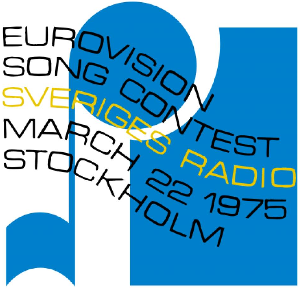
The Eurovision Song Contest 1975 was the 20th edition of the Eurovision Song Contest, held on 22 March 1975 in the Sankt Eriks-Mässan in Stockholm, Sweden. Organised by the European Broadcasting Union (EBU) and host broadcaster Sveriges Radio (SR), and presented by Karin Falck, the contest was held in Sweden following the country's victory at the 1974 contest with the song "Waterloo" by ABBA.

The Eurovision Song Contest 1996 was the 41st edition of the Eurovision Song Contest, held on 18 May 1996 at the Oslo Spektrum in Oslo, Norway. Organised by the European Broadcasting Union (EBU) and host broadcaster Norsk rikskringkasting (NRK) and presented by Ingvild Bryn and Morten Harket, the contest was held in Norway following the country's victory at the 1995 contest with the song "Nocturne" by Secret Garden.

The Eurovision Song Contest 1997 was the 42nd edition of the annual Eurovision Song Contest, held on 3 May 1997 at the Point Theatre in Dublin, Ireland. Organised by the European Broadcasting Union (EBU) and host broadcaster Radio Telefís Éireann (RTÉ) and presented by Carrie Crowley and Ronan Keating, the contest was held in Ireland following the country's victory at the 1996 contest with the song "The Voice" by Eimear Quinn. The 1997 contest was the seventh – and to date last – edition to be staged in Ireland, as well as the fourth to be produced by RTÉ in five years. The Point Theatre served as the host venue for the third time, following the 1994 and 1995 contests, becoming the only venue to have been the site of three Eurovision Song Contests.

